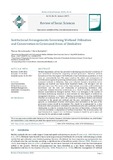Please use this identifier to cite or link to this item:
https://cris.library.msu.ac.zw//handle/11408/3453Full metadata record
| DC Field | Value | Language |
|---|---|---|
| dc.contributor.author | Marambanyika, Thomas | - |
| dc.contributor.author | Beckedahl, Heinz | - |
| dc.date.accessioned | 2019-02-15T14:33:47Z | - |
| dc.date.available | 2019-02-15T14:33:47Z | - |
| dc.date.issued | 2017 | - |
| dc.identifier.issn | 2378-8569 | - |
| dc.identifier.uri | https://www.socialsciencejournal.org/index.php/site/article/view/71 | - |
| dc.identifier.uri | http://hdl.handle.net/11408/3453 | - |
| dc.description.abstract | Wetland degradation and loss has persisted in developing countries due to existence of poor institutional frameworks supporting wetland governance. Therefore, wetland ecosystem services that support the livelihoods of most subsistence populations in rural areas are concomitantly lost. This paper explores the nature and consequences of institutional arrangements governing wetland access, utilization and conservation in six communal wetlands in Zimbabwe. Data were collected through a household survey targeting one hundred and twenty-three household heads, sixty teenagers and key informant interviews. The results of the study indicate a complex, multi-institutional involvement and the roles and relationship of participating institutions often compromise wetland resources conservation as a result of conflicts, confusion and tensions exacerbated by divergent motives. There is no homogeny in the number of institutions determining utilization at each wetland nor their degree of influence on management decisions; a situation reflecting inconsistency in existing institutional structure at communal level. Given the proximity of traditional leaders and wetland committees to the people and wetlands and the poor participation of government agencies, an institutional structure which places local institutions at the core of the governance system should be formulated. This should be complemented by a clear framework which promotes co-ordination of institutional roles and clarification of their relationships in order to minimize discord in execution of their duties; a situation that currently contributes to degradation of wetland ecosystems. The necessary policy and legal framework to support such institutional framework should be put in place and resources for its operations made available. | en_US |
| dc.language.iso | en | en_US |
| dc.publisher | LAR Centre Press | en_US |
| dc.relation.ispartofseries | Review of Social Sciences;Vol. 02, No. 01: p. 1-16 | - |
| dc.subject | Local Communities | en_US |
| dc.subject | Wetland Governance | en_US |
| dc.subject | Wetland Management | en_US |
| dc.subject | Stakeholder participation | en_US |
| dc.subject | Zimbabwe | en_US |
| dc.title | Institutional arrangements governing wetland utilization and conservation in communal areas of Zimbabwe | en_US |
| dc.type | Article | en_US |
| item.fulltext | With Fulltext | - |
| item.openairetype | Article | - |
| item.languageiso639-1 | en | - |
| item.cerifentitytype | Publications | - |
| item.grantfulltext | open | - |
| item.openairecristype | http://purl.org/coar/resource_type/c_18cf | - |
| Appears in Collections: | Research Papers | |
Files in This Item:
| File | Description | Size | Format | |
|---|---|---|---|---|
| Institutional arrangements and wetlands in Zimbabwe.pdf | Full Text | 831.74 kB | Adobe PDF |  View/Open |
Page view(s)
16
checked on Jul 26, 2024
Download(s)
14
checked on Jul 26, 2024
Google ScholarTM
Check
Items in MSUIR are protected by copyright, with all rights reserved, unless otherwise indicated.


